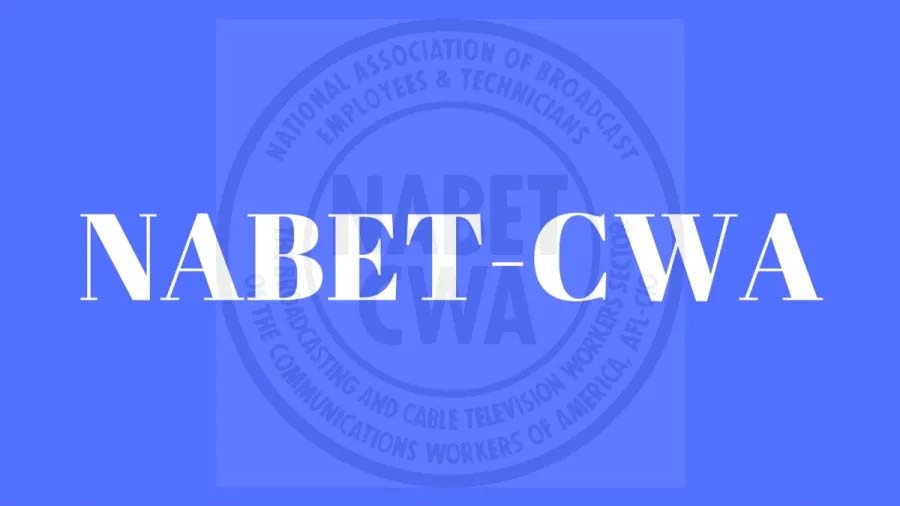NABET-CWA Blasts Attempts to Delete FCC Ownership Regs
American Economic Liberties Project, the Open Markets Institute and United Church of Christ joined the union in filing

WASHINGTON—The union representing broadcast technicians is pushing back against a major effort by the National Association of Broadcasters and station owners to eliminate the ownership rules governing over-the-air TV stations.
Union NABET-CWA (the National Association of Broadcast Employees and Technicians–Communications Workers of America) has filed a letter with the FCC arguing that lifting the ownership regulations is unnecessary, not in the public interest and outside of the regulator’s authority. Joining NABET-CWA in filing the letter were the American Economic Liberties Project, the Open Markets Institute and United Church of Christ, Office of Communications.
The letter was filed in the FCC’s docket for public comments called “In Re: Delete, Delete, Delete,” which has drawn lengthy filings and letters from NAB, the Society of Broadcast Engineers, state broadcasting associations, America’s Public Television Stations, PBS, Nexstar Media Group, Sinclair, Gray Media, Mission Broadcasting and many individual TV stations. Many of those filings, including those from NAB, Nexstar, Sinclair and Gray Media, have focused on the need to eliminate ownership rules.
In their letter , NABET and the other groups argued that “we write to emphasize that the Commission should not remove or modify the national or local media ownership rules.”
“The request for comments in this docket was outside of regular Commission practice, was not adopted by vote of the Commission or by staff under identified delegated authority, and is not a notice of proposed rulemaking or a notice of inquiry,” the letter said. “As such, any steps the Commission might take in response to comments that are filed would require further notice of proposed rulemaking or procedure to comply with FCC rules and the Administrative Procedure Act (APA). The APA requires notice of a proposed change in the Federal Register in order to change rules, whether to adopt new rules or modify or ‘delete’ rules.”
In addition, the letter noted that those arguing for the deletion of ownership rules have overemphasized changes to the news landscape. “Broadcasting continues to be unique and essential to local news and democracy, and streaming video and websites are not a replacement for local broadcasting," the letter argued. "The pro-consolidation broadcasters argue that the rise of online video streaming and ‘big tech’ constitute a market and technological change that requires removal of any limits on broadcaster consolidation in order for broadcasters to amass the necessary capital to remain in existence. As discussed by the Leadership Conference on Civil and Human Rights (LCCHR) and other parties in filings in recent dockets, the reality of broadcasting today does not support this argument.”
“As stated by the LCCHR in the most recent Quadrennial Review docket, the pro-consolidation broadcasters ‘mistakenly characterize the availability of content distributed through the Internet as content created by online-only sources,’ ” the letter stressed. “Indeed, recent studies show that a majority of Americans still access news via TV news stations, and among those who get news from local TV stations, 37% say they mainly access that information online—whether from a TV station’s website, app, email newsletter or social media posts.
The professional video industry's #1 source for news, trends and product and tech information. Sign up below.
"While today there are indeed ‘online audio and video streaming services too numerous to quantity or recount,’ well-resourced entities that have the infrastructure to create local news content are far fewer," the letter continued. "An increasing number of ‘YouTube stars’ and ‘social media platforms’ does not change the reality that, as Nexstar itself states in its comment, local broadcasters ‘provid[e] communities with often the only reliable local news, sports, weather and emergency information.’ ”
The letter continued: “The suggestion that a flood of “content creators” online is a technological change which requires that local news must be able to consolidate without limit or face extinction is a red herring not borne out by the reality of Americans’ news consumption habits, as stated above, or by the reality of the industry’s profitability. For example, Nexstar is the nation’s largest owner of local broadcast television stations and currently reaches 70% of American households.8 In the fourth quarter of 2024, Nexstar reported a record net revenue of $1.49 billion and returned $820 million to shareholders in the form of dividends and share repurchases. 2024 was the twelfth year in a row in which the company increased its dividend.”
The letter also argues that “broadcasters’ arguments rephrase under the window-dressing of streaming video a decades-old goal of increasing consolidation and profitability, and fail to address the need for further regulation of ‘big tech’ and streaming video.”
The FCC lacks the authority to change the ownership caps, the letter argues, because “Congress did not intend that the Commission would be able to change the national cap.”
“In any event, as stated above, maintaining the national cap is in the interest of the public and consumers, and continues to serve the goals of localism in our nation’s news ecosystem,” the letter adds. “Permitting further consolidation will increase the likelihood that journalism and news are created in centralized offices, removed from the local communities a broadcast licensee serves.”
The full letter can be found here.
George Winslow is the senior content producer for TV Tech. He has written about the television, media and technology industries for nearly 30 years for such publications as Broadcasting & Cable, Multichannel News and TV Tech. Over the years, he has edited a number of magazines, including Multichannel News International and World Screen, and moderated panels at such major industry events as NAB and MIP TV. He has published two books and dozens of encyclopedia articles on such subjects as the media, New York City history and economics.

